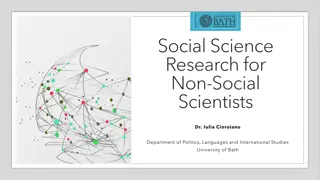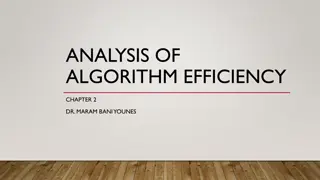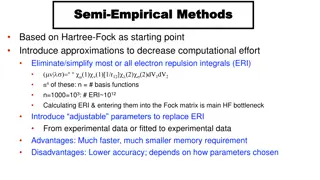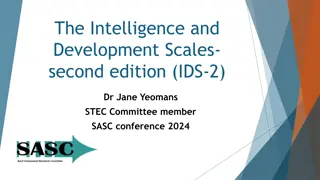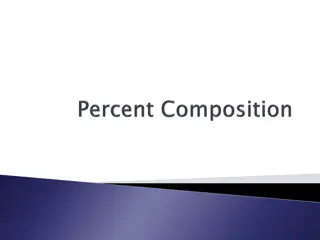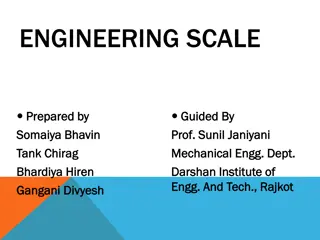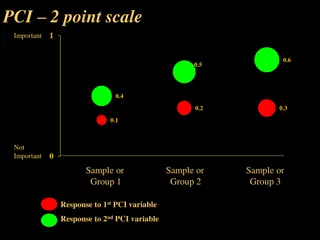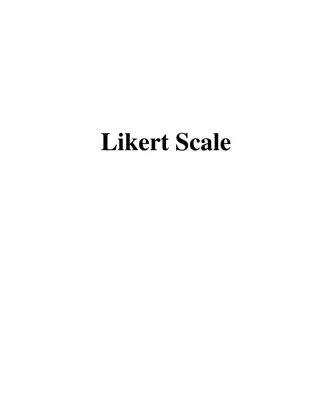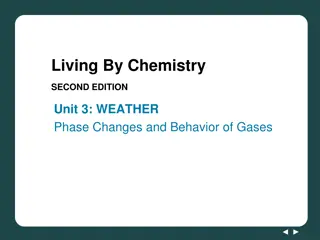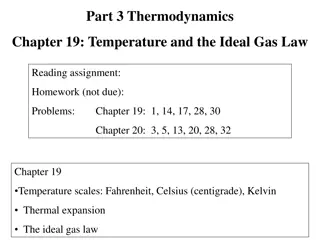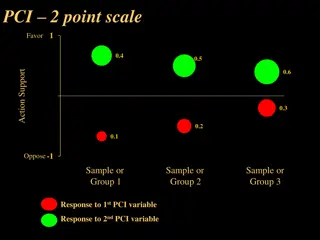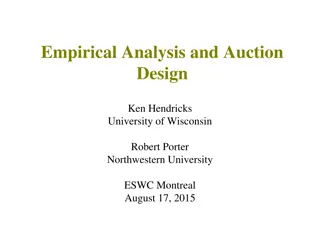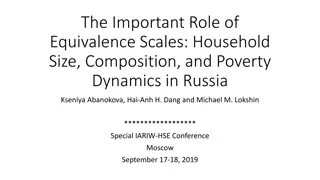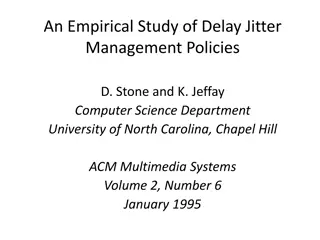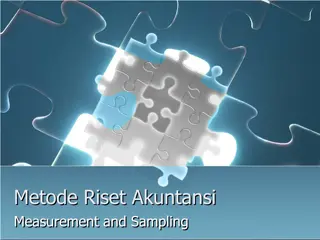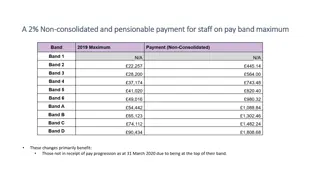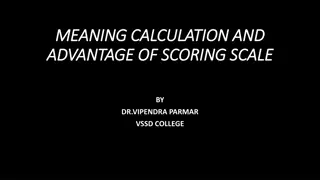Understanding Vernier Scales and Precision Measurement Devices
Vernier scales, named after French cartographer Pierre Vernier, enhance precision in measuring even the smallest scale divisions. Instruments like the theodolite, slide calipers, and Fortin's barometer utilize vernier scales for accurate readings. Learn about key terms like least count and vernier c
5 views • 11 slides
Procedure for Quantifying Interlaminar Damage in Refractory Composites Using Micro-X-Ray CT
This study presents a method to quantify interlaminar damage in refractory composites through in-situ micro-X-ray computed tomography. The procedure aims to capture the progressive failure in ASTM-sized specimens, providing empirical data for improving simulations of composite materials. Various spe
6 views • 19 slides
WMO Scale of Assessment of Members' Contributions for 2024-2027 Period
The WMO scale of assessment for members' contributions is based on the latest United Nations scales approved by the General Assembly. The scales for the 2024-2027 period will be determined considering the UN scales from the 2021 and 2024 sessions. Adjustments for membership differences will be made,
4 views • 6 slides
Understanding Measurement Scales and Scaling Techniques
Measurement scales play a crucial role in marketing research, with techniques like scaling helping to categorize data. The content discusses four types of measurement scales: nominal, ordinal, interval, and ratio, outlining their characteristics and differences. Scaling techniques involve placing re
5 views • 7 slides
Exploring Melodic Ideas with Pentatonic Scales in Music Composition
Delve into the world of music composition by understanding and utilizing pentatonic scales to develop captivating melodies. Learn key terminology, explore the C pentatonic scale, and discover how major and minor pentatonic scales can influence the mood of your compositions. Dive deep into the power
1 views • 18 slides
Understanding Social Science Research for Non-Social Scientists at University of Bath
This resource delves into social science research fundamentals, encompassing types of inquiry, empirical research categories, primary and secondary research distinctions, and the importance of selecting a suitable research topic. It offers guidance on initiating research based on empirical observati
1 views • 10 slides
Understanding Algorithm Efficiency Analysis
In this chapter, Dr. Maram Bani Younes delves into the analysis of algorithm efficiency, focusing on aspects such as order of growth, best case scenarios, and empirical analysis of time efficiency. The dimensions of generality, simplicity, time efficiency, and space efficiency are explored, with a d
1 views • 28 slides
Overview of Semi-Empirical Methods Based on Hartree-Fock
Semi-empirical methods derived from Hartree-Fock theory aim to reduce computational effort by approximating or eliminating electron repulsion integrals. Strategies include introducing adjustable parameters to replace ERI calculations and utilizing zero differential overlap methods like CNDO, INDO, N
1 views • 11 slides
Parallel Implementation of Multivariate Empirical Mode Decomposition on GPU
Empirical Mode Decomposition (EMD) is a signal processing technique used for separating different oscillation modes in a time series signal. This paper explores the parallel implementation of Multivariate Empirical Mode Decomposition (MEMD) on GPU, discussing numerical steps, implementation details,
1 views • 15 slides
Comprehensive Overview of the Intelligence and Development Scales - Second Edition (IDS-2)
The Intelligence and Development Scales - Second Edition (IDS-2), developed by Dr. Jane Yeomans, is a comprehensive assessment tool for individuals aged 5 to 21. It includes cognitive and general development domains, with subtests covering intelligence scales, executive functions, psychomotor skills
0 views • 25 slides
Understanding Scales in Maps and Plans
Explore the concept of scales in maps and plans, including number scales and bar scales. Learn how to work with different scales, calculate actual distances, and understand the advantages and disadvantages of each scale type. Engage in activities to reinforce your understanding of scales in a practi
0 views • 32 slides
Understanding Percent Composition and Empirical Formulas in Chemistry
The Law of Definite Proportions governs the composition of compounds based on molar masses, allowing us to calculate percentage compositions of elements within a compound. Through examples involving various compounds like Fe3C, sulfur dioxide, ammonium nitrate, glucose, and acetic acid, we explore t
3 views • 7 slides
Empirical Research on Surrogacy in New Zealand: Key Findings
Associate Professor Debra Wilson from the University of Canterbury in New Zealand conducted empirical research on public opinions regarding surrogacy. The findings revealed three surprising results, including perspectives on surrogates being compensated, the importance of genetics in surrogacy arran
0 views • 11 slides
Generalization of Empirical Risk Minimization in Stochastic Convex Optimization by Vitaly Feldman
This study delves into the generalization of Empirical Risk Minimization (ERM) in stochastic convex optimization, focusing on minimizing true objective functions while considering generalization errors. It explores the application of ERM in machine learning and statistics, particularly in supervised
0 views • 11 slides
Empirical Analysis of Kuwaiti Dinar Exchange Rate Behavior and Misalignment
This research focuses on studying the behavior of the real equilibrium exchange rate (REER) of Kuwaiti Dinars, estimating the equilibrium exchange rate using the BEER model, and calculating real exchange misalignments (RERM). It delves into the impact of exchange rate fluctuations on macroeconomic v
0 views • 15 slides
History of Chemotherapy: From Empirical Use to Modern Era
The history of chemotherapy is divided into three phases, starting from the empirical use of compounds in ancient times to the modern era marked by targeted drug development. Ehrlich's pioneering work in the late 19th to early 20th centuries laid the foundation for understanding the selective toxici
0 views • 15 slides
Empirical Study on CSS Preprocessors: Insights and Findings
Exploring the utilization of CSS preprocessors in web development through an empirical study conducted by Davood Mazinanian and Nikolaos Tsantalis from Concordia University. The study delves into the motivations behind using CSS preprocessors, developers' preferences, features offered by preprocesso
0 views • 24 slides
Salary Study Recommendations Summary
The salary study conducted on February 24, 2015 highlighted certain flaws in the current state of the professional, administrative, classified, and facilities scales. The options presented include creating new scales with a uniform distribution or adjusting existing scales to eliminate frozen steps.
0 views • 13 slides
Empirical Evaluation of De Goede Learning Potential Model
This research paper focuses on the modification and extension of the De Goede Learning Potential Structural Model, aiming to identify non-cognitive variables influencing learning potential. Through model development, hypothesis testing, and empirical evaluation, the study explores factors such as In
0 views • 12 slides
Engineering Scale and Different Types of Scales
Engineering scale plays a crucial role in reducing or enlarging dimensions of large or tiny objects to fit standard size drawing sheets. This article covers the concept of reducing scale, representative factor, types of scales like plain, diagonal, vernier, and more, along with detailed construction
0 views • 11 slides
Understanding Empirical vs Analytical Expressions in Natural Language Processing
Restricted quantifiers and literal analysis in natural language processing reveal the distinctions between empirical and analytical expressions. While empirical expressions refer to non-trivial intensions that require empirical investigation, analytical expressions denote constant intensions that ca
1 views • 19 slides
Comprehensive Overview of Point Comparison Importance (PCI) Scales
Explore a detailed examination of various Point Comparison Importance (PCI) scales ranging from 2 to 9 points, each assessing the importance level of different variables. These scales provide insights into respondents' perceptions, with descriptions and sample groups for each scale illustrated in th
0 views • 8 slides
Empirical Credit Risk Management at FMB Group Credit Union
Empirical Credit-Risk Management (ECM) presentation to FMB Group Credit Union by Financial Analytics Ltd discusses the background, traditional forecasting methods, income and risk recognition, provisioning approaches, and benefits for credit unions. ECM offers expert retail credit risk management th
0 views • 25 slides
Exploring Likert Scale and Survey Examples for Effective Data Collection
Dive into the world of Likert scale with examples for surveys covering agreement, relevance, frequency, importance, quality, likelihood, dichotomous scales, three-point scales, four-point scales, five-point scales, and seven-point scales. Understand the nuances of expressing opinions, preferences, a
0 views • 5 slides
Impact of ZLECAf in North Africa: Empirical Evaluation
The Economist, Aziz Jaid, from the CEA Bureau for North Africa conducted an empirical evaluation on the impact of the ZLECAf in North Africa, focusing on goods. The context includes coverage of seven countries, the rationale behind the ZLECAf agreement, and details on the liberalization scenarios an
0 views • 13 slides
Understanding Temperature Measurement with Thermometers
Explore the principles of temperature measurement through thermometers, understanding phase changes, behavior of gases, and creating temperature scales. Compare weather forecasts between Moscow and Washington, discussing which city will be warmer and predicting precipitation types. Dive into discuss
0 views • 14 slides
Understanding Temperature Scales and the Ideal Gas Law
This comprehensive guide delves into temperature scales, thermal expansion, and the ideal gas law. Explore the origins of Fahrenheit, Celsius, and Kelvin scales, and learn how to convert between them. Discover the concept of heat, thermal equilibrium, and the Zeroth Law of Thermodynamics. Gain insig
0 views • 14 slides
Comprehensive Overview of Point Contrast Interview Scales
Explore a detailed comparison of various Point Contrast Interview scales ranging from 2-point to 9-point scales. Each scale reflects different levels of favor, action support, uncertainty, and opposition, along with sample responses. The scales provide a structured framework for assessing opinions a
0 views • 8 slides
Understanding Auction Design: Empirical Analysis and Practical Insights
Auctions play a crucial role in various sectors due to their efficiency in price discovery and resource allocation. This article delves into auction design issues, the role of structural analysis, and the transformative Laffont program. Discover the importance of empirical analysis in optimizing auc
0 views • 59 slides
The Important Role of Equivalence Scales in Poverty Dynamics
Equivalence scales play a crucial role in measuring household welfare and poverty dynamics in Russia. This study explores the impact of adjusting scales on poverty lines, chronic poverty, and income mobility using subjective well-being data. The findings reveal higher elasticity for adding adults to
0 views • 26 slides
Understanding Percent Composition and Empirical Formulas
Explore the concept of percent composition, empirical formulas, and how to determine them through examples. Learn how to convert percentages to grams, calculate moles, and find the simplest ratio among elements in a compound.
0 views • 9 slides
An Empirical Study of Delay Jitter Management Policies
This study explores delay jitter management policies to support interactive audio over LANs, focusing on display queue management to minimize gaps in playout. The paper evaluates different queue management policies, including I-policy and E-policy, along with queue monitoring in the context of an em
0 views • 37 slides
Dependability of College Student Ratings on Teaching and Learning Quality
The study investigates the dependability of college student ratings on teaching and learning quality using Teaching and Learning Quality Scales (TALQ). The research aims to develop more predictive and reliable items to address accountability concerns in higher education, focusing on factors like Aca
0 views • 26 slides
Development and Evaluation of Harm Reduction Acceptance Scales
Development of scales to measure the acceptance of harm reduction is crucial for understanding public attitudes towards harm reduction strategies. This project focuses on creating valid and reliable scales through a systematic process involving item development, data collection, analysis, and refine
0 views • 15 slides
Understanding Accounting Research Methods: Measurement and Sampling
Measurement is a crucial aspect of research in accounting. It involves assigning numbers to empirical events, objects, or properties. Measurement consists of selecting measurable phenomena, developing mapping rules, and applying these rules appropriately. The process of measurement includes determin
0 views • 63 slides
The Interplay Between Theoretical Psychology and Empirical Research
Exploring the potential for collaboration between philosophy, theoretical psychology, and empirical research, this article delves into the historical divide, recent renaissance, and avenues for mutual enrichment. It raises questions about how each discipline can contribute to and benefit from the ot
0 views • 16 slides
Explaining How Dragons Glide Through the Skies
Dragons use their wings and scales to glide effortlessly through the sky in search of their next meal. By tilting their wings and adjusting their scales, dragons are able to steer and glide smoothly without flapping their wings constantly. This text focuses on the mechanics of dragon flight, highlig
0 views • 5 slides
Pay Band Adjustments and Scales Update
Changes in pay band structures and scales have been implemented to benefit staff members at the top of their pay bands, those ineligible for pay progression, new starters, and recently promoted employees. Details include adjustments for staff on pay band maximums, removal of minimum points in pay ba
0 views • 4 slides
Understanding Scales and Representative Fractions in Technical Drawings
Scales play a crucial role in technical drawings by representing the ratio of the linear dimensions of an object to its actual dimensions. This text explains the concept of scales, including enlargement and reduction scales, representative fractions (RF), recommended scales by BIS (SP.46: 2003), and
0 views • 29 slides
Understanding Scoring Scales: Meaning, Calculation, and Advantages
Scoring scales are used to assign numerical values to observations for quantifying attributes or behaviors in various fields. They provide a systematic way to evaluate or measure variables, convert qualitative data into quantitative data, and facilitate analysis and interpretation. This article disc
0 views • 22 slides





